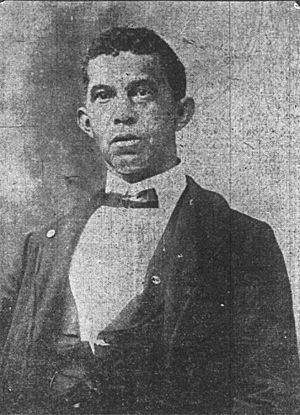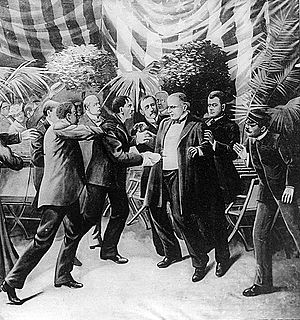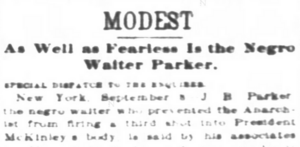James Benjamin Parker facts for kids
Quick facts for kids
James Benjamin Parker
|
|
|---|---|

Parker pictured in 1901
|
|
| Born | July 31, 1857 |
| Died | April 13, 1907 (aged 49) |
| Known for | intervening in the assassination of William McKinley |
| Height | 6 ft 6 in (198 cm) |
James Benjamin Parker (born July 31, 1857 – died April 13, 1907) was an African-American man. He is best known for trying to stop the attack on President William McKinley. This happened when McKinley was shot by Leon Czolgosz.
Contents
Early Life and Work
James Benjamin Parker was born in Atlanta, Georgia in 1857. His parents were enslaved, meaning they were not free. As he grew up, Parker worked many different jobs. He sold newspapers for the Southern Recorder. He also worked as a constable, which is like a police officer.
Later, Parker moved to Chicago, Illinois. There, he worked as a waiter. He then returned to Atlanta and became a mail carrier for the United States Postal Service. He moved several more times, living in Saratoga, New York, New York City, and finally Buffalo, New York. In Buffalo, he got a job with a food service company. This job was at the Plaza Restaurant during the Pan-American Exposition.
The Attack on President McKinley
How the Attack Happened
Before September 6, 1901, Parker had lost his job at the Plaza Restaurant. On that day, he went to the Hall of Music at the Pan-American Exposition. President William McKinley was there meeting people.
Security was very tight because of worries about the President's safety. Other leaders in Europe had been attacked. McKinley's private secretary, George B. Cortelyou, was very concerned. Many police officers and security guards were watching the doors. Soldiers stood near the President. They were told to quickly surround anyone who looked suspicious. Two United States Secret Service agents were also close to McKinley.
Parker's Brave Actions
Usually, people meeting the President had to show their empty hands. But it was a hot day, so many people carried handkerchiefs. A man named Leon Czolgosz was in line in front of Parker. Czolgosz hid a pistol under his handkerchief. When he got close to McKinley, he fired the gun twice.
After the second shot, James Parker acted quickly. He punched Czolgosz in the neck. Then, he tackled him to the ground. A soldier and a Buffalo police officer quickly joined Parker. They helped hold Czolgosz. Other soldiers, police, and people nearby also helped. They hit Czolgosz until President McKinley told them to stop.
One witness said Parker knocked the gun from Czolgosz's hand. He then spun Czolgosz around. The witness also said Parker broke Czolgosz's nose and lip.
Parker later spoke about what happened. He said, "I heard the shots. I did what every citizen of this country should have done." He added, "I am sorry I did not see him four seconds before." Parker felt that the President's life was more important than his own. He wished he could have stopped the bullets.
In another interview, Parker said something special. He mentioned that Father Abe (President Lincoln) had freed him. Now, he felt he had helped save Lincoln's successor.
After the Event
After the shooting, many people wanted to offer Parker money. One company wanted to sell his photograph. But Parker refused. He said he did not want to profit from such a sad event. He was just glad he could help his country.
At first, people hoped President McKinley would get better. An African-American newspaper called the Savannah Tribune praised Parker. It said, "the life of our chief magistrate was saved by a Negro." It also said that African Americans were very loyal to the country.
Sadly, President McKinley died about a week later. Czolgosz was quickly put on trial and found guilty. He was executed 45 days after McKinley's death. Parker was not asked to speak in court. However, his actions were praised by Booker T. Washington in a speech. A preacher named Lena Doolin Mason wrote a poem about Parker. It was called "A Negro In It." The poem honored Parker's bravery. It reminded people that African Americans had always risked their lives for their country.
Later Life and Legacy
After the attack, Parker left Buffalo. He spent the holidays with his family in Atlanta. Then, he traveled across the United States. He gave talks to many people in cities like Nashville, Tennessee, Long Branch, New Jersey, Brooklyn, New York, and Pittsburgh, Pennsylvania. One year after the attack, Parker was the main speaker at a special service. It was held at the People's AME Zion Church in Providence, Rhode Island.
There was talk that Parker might get a job as a messenger for the United States Senate. But this did not happen. He later worked as a traveling salesman. He sold a magazine for African-American railroad and hotel workers. For many years, not much was known about what he did after this.
In early 1907, Parker was in Atlantic City, New Jersey. He was arrested by local police because he seemed unwell. Friends helped him, and he was released into their care. They went to Philadelphia, Pennsylvania. Parker stayed in a boardinghouse there. One night, a police officer saw Parker acting strangely. He was taken into custody. A doctor examined Parker and decided he needed care. Parker was then admitted to Philadelphia State Hospital at Byberry.
Parker was at the hospital for a short time. He passed away on April 13, 1907. The cause of death was heart problems. Since no one claimed his body, it was sent for medical study.
|
 | William L. Dawson |
 | W. E. B. Du Bois |
 | Harry Belafonte |



